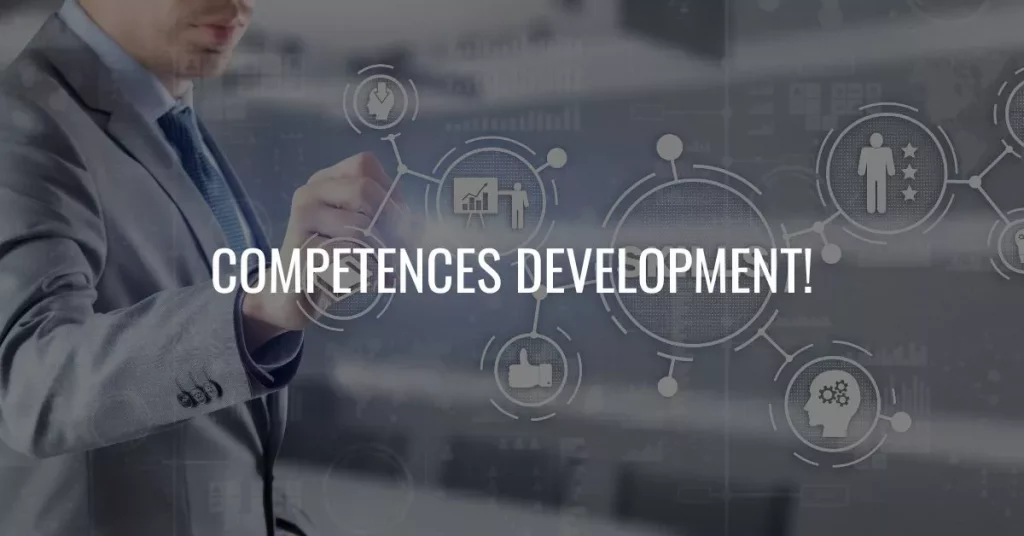Competences Development!
Competence development is very important for organizations, so many companies try to develop employees’ competencies to achieve the company’s goals and be able to compete with the competitors; in this article, we will teach you how individuals and companies should do to develop their individuals and employees’ competencies.
There are three main skills you should acquire to develop your competencies (knowledge, motivations, and learning operational skills).

Competences development by knowledge:
If you want to develop any competence, first you should know and learn all needed knowledge about this competence; you should learn:
- How you can develop this competence.
- What other skills are required to develop that competence, and how you can acquire them.
- What the benefits are when you develop this competence.
You can know and learn all the needed knowledge by attending courses, reading special articles or books, or learning from expert persons.
Motivations:
The motivations are the secret to implementing any difficult action or making a decision, so to develop any competence you should have the reasons or motivations to do.
If there is no motivation or logical reason to develop competence, you won’t develop anything.
Motivations examples:
- New job: if you want to change your job or you are a new graduate and searching for a job; it’s a good opportunity to develop your competencies and to have a good CV; the individual may learn new skills to get a job which is better than the current job.
- New title or position: most employees like to have good titles or positions; the intelligent manager keeps in his mind this point and uses this motivation to develop any competence for the employees to achieve the company’s goals.
EX: the manager should inform the employees about the required skills and competencies for acquiring good positions.
- Having appreciating and adding value: this motivation often is suitable for old employees because they often don’t care about physical motivations but they usually care about feelings and emotions.
- Additional income: this motivation is suitable for new employees because they often search for money, so the intelligent manager motivates new employees by increasing income, he may allocate funds for employees to develop their competencies.
- Saving time and efforts: saving time and effort may be good motivations to develop competencies like time management, teamwork, delegation . . . . etc.
All or some of the above motivations may lead individuals or companies to develop competencies; EX: the companies may develop employees’ delegation competence by (saving time, saving efforts, and new position) motivations at the same time.
Learning operational skills:
The last element required for the development of competencies is possession of the operational skills that enable them to be performed. This requires appropriate training, which consists of repeating actions to acquire the operational habits corresponding to that competence.
- For example, delegation requires the development of a number of skills, among others: knowing the people we work with and their potential; distributing objectives adequately; and monitoring their accomplishments. Each skill is composed in turn of different habits which are acquired by repeating acts.
- For example, good monitoring requires, among others, habits such as writing down each subordinate’s objectives and the time given to accomplish them, scheduling times to see how the subordinate is progressing, helping him to overcome the obstacles that appear, and SO
Competences development challenges:
As we will see in the next example, the process by which competence is developed is not simple and can become frustrating when the hoped-for results are slow in coming.
- Initially, the manager who has not developed this competence may find it quite difficult to delegate, as he is faced with a motivational conflict: on the one hand, he realizes that he should delegate more but, on the other hand, he feels more secure if he controls everything since that is what he has always done and the results have been more or less satisfactory.
- To start the change process, he will have to use his will and make decisions based on his rational motivation, going against his affective motivation to not delegate. This effort requires an attitude of commitment to learning the competence.
- He will also find it difficult to delegate because he does not have the necessary skills to do this well. However, if he starts to gradually delegate certain tasks or objectives to his subordinates, he will practice the skills required in delegation and will accumulate experience on the advantages that this competence has for him and for his subordinates.
- He may even be surprised to find that his subordinates are more capable than he initially thought. Finally, there will come a point when his affective motivation leads him to delegate more tasks and he will have also developed the necessary skills to effectively carry out these decisions.
The delegation will then become one of the manager’s habitual behaviors and we can say that he has developed that competence.
It is a common experience that many people have to go through when learning a language, a sport or any other competence. In this process, the coach’s assistance is invaluable. To start with, there are technical aspects that the person who is learning cannot obtain by himself: relevant information (the specific information that that individual needs), appropriate tips (including corrections), and the right training (to learn the necessary skills at levels of increasing complexity).
But above all, the coach’s job consists of maintaining, in the person he is coaching, the attitude of commitment to learning that is absolutely indispensable for acquiring any competence.
The true coach is able to raise spirits in difficult times, revive the will to improve in the individual who has thrown in the towel and is also able to detect when a person has reached his limit and should not be pushed any further.
This is not easy to achieve, and requires a minimum level of knowledge about the role played by will in the decision-making process, in addition to a certain degree of empathy to sense how the person is feeling at any given time. To help us in this, we will discuss in more depth how will act and how we can foster a positive attitude towards learning in the next article.

Patrick is a lifelong learner and personal development blogger whose work focuses on mindset shifts, emotional growth, and the hard-won lessons from real-life challenges.
Qualities: Relatable, honest, introspective, growth-oriented.
